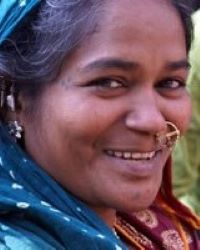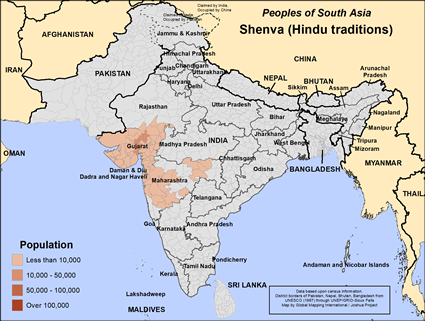Shenva (Hindu traditions) in Pakistan

Photo Source:
Copyrighted © 2026
Isudas All rights reserved. Used with permission |

Map Source:
People Group data: Omid. Map geography: UNESCO / GMI. Map Design: Joshua Project.
|
| People Name: | Shenva (Hindu traditions) |
| Country: | Pakistan |
| 10/40 Window: | Yes |
| Population: | 1,700 |
| World Population: | 120,700 |
| Primary Language: | Sindhi |
| Primary Religion: | Hinduism |
| Christian Adherents: | 0.00 % |
| Evangelicals: | 0.00 % |
| Scripture: | Complete Bible |
| Ministry Resources: | Yes |
| Jesus Film: | Yes |
| Audio Recordings: | Yes |
| People Cluster: | South Asia Dalit - other |
| Affinity Bloc: | South Asian Peoples |
| Progress Level: |
|
Introduction / History
The Shenva, also known as Rawat or Chenva, consist of several exogamous clans which means the clans do not intermarry. According to their tradition they are descendants of Rajput who fled into the forests. The primary occupation of Shenva in India and Pakistan is agriculture.
The main language of the Pakistani Shenva is Sindhi. A complete Bible and the JESUS Film are available in this language.
A tiny group of Shenva claim to be followers of Jesus Christ.
The vast majority of the Hindu Shenva people live in India. A small group resides in Pakistan. Many Hindus left Pakistan for India after the Partition in 1947. Many Muslims fled to Pakistan at the same time.
What Are Their Lives Like?
Some Shenva work their own land while others farm on land owned by others. They farm rice, wheat, maize, lentils, coconuts, palm trees, and vegetables. Women make brooms and mats to trade for things the Shenva cannot make for themselves such as cell phones, motorbikes and appliances. Some Shenva men have become educated and work in government, education, trade, and business. Many young Shenva are moving to cities searching for a better life.
Many Shenva women are unable to read and write. The girls who do go to school often quit after a few years to help their family make a living. Families arrange weddings with the consent of the young people. Girls marry in the middle teens and boys in their late teens or early twenties. Newly married couples live with the groom's family until they are able to afford their own house. Monogamy or marriage to one spouse is the norm. The Shenva tend to have large families. Unfortunately, many Shenva children die before the age of ten due to lack of access to modern medicine. It is the sons' responsibility to take care of elderly parents.
What Are Their Beliefs?
The Shenva worship Shree Chamunda Mataji, which are clan deities, on festivals and during life-cycle ceremonies such as births, weddings and deaths. The Shenva people practice Hinduism, the ancient religion of India. Hinduism is a catch-all phrase for the local religions of South Asia, so it is very diverse. At the popular level, Hindus worship and serve the gods of the Hindu pantheon. They visit Hindu temples and offer prayers, food, flowers, and incense to their gods in hopes of gaining protection and benefits. They do not have a personal or familial relationship with their gods as Christians do. There are other Hindus who are much more philosophical, especially among the Brahmins.
Almost all Hindus participate in yearly celebrations like Holi, the festival of colors and the start of spring / Diwali, the festival of lights / Navratri, the celebration of autumn / and Rama Navami, Rama's birthday.
What Are Their Needs?
The Shenva would benefit by having access to modern medicine. If the Shenva are to better their place in society, their girls will need literacy skills. Most of all, the Shenva need to hear and respond to the gospel of Jesus Christ. He alone can forgive their sins and give them eternal life.
Prayer Points
Please pray for loving workers to go to the Hindu Shenva people of Pakistan.
Pray that the small number of Shenva Christian believers will be properly instructed in the ways of Christ, and will live holy lives in the power of the Lord's Spirit.
Pray that Shenva believers will represent Christ well to their families and friends.
Pray for better employment opportunities for these people. Pray for new job skills.
Pray that the Lord raises up a disciple making movement among the Pakistani Shenva.